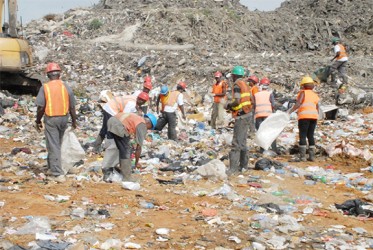The Haags Bosch Sanitary Landfill will not extend its operating time and waste collectors will have to adapt to the current hours; it is urging citizens to become more au fait with recycling and composting instead.
In a press release issued yesterday, Haags Bosch reminded that it was not a dumpsite, and that extended hours or continuous operation of the landfill would be detrimental as time was needed for properly dealing with leachate, adequate compaction and covering at the end of the day. The release said these would not be possible with extended waste disposal hours.
Haags Bosch also announced that a recently purchased landfill compactor will soon be in use and will provide significant improvements. The compactor would be used to compress more waste, thereby extending the capacity and life of the landfill as well as reducing odour and leachate emissions and improving the operation of the landfill on the whole, the release said. Apart from these important environmental benefits, the more densely compacted waste will degrade more efficiently, thereby creating the opportunity for economic benefits, like electricity production from the methane gas produced when the waste decomposes, it added.

Inviting citizens to help with solid waste management, Haags Bosch urged that organic household waste be separated and composted. This is noted would significantly reduce the amounts of household waste taken to the landfill for disposal and citizens can benefite from having compost, which is a rich soil enhancer.
The release said that the Clean, Green Guyana Campaign, being administered by the Ministry of Local Government and Regional Development and funded by the Inter-American Development Bank, is currently conducting a pilot with residents of Mocha and Friendship, East Bank Demerara and Mon Repos, East Coast Demerara.
The release noted that waste separation is a large part of the operation of Haags Bosch. Since it is conducted in a controlled manner, the release said, it allows for the accumulation of data on the different types of waste being disposed of that may lead to the development and implementation of important national solid waste disposal policies, like one on recycling, to better deal with Guyana’s growing problem of disposing of plastics, particularly soft drink and water bottles. It noted too that plastics, metal, glass and certain other materials have value and their recovery for reuse and recycling and can have economic and social benefits.




